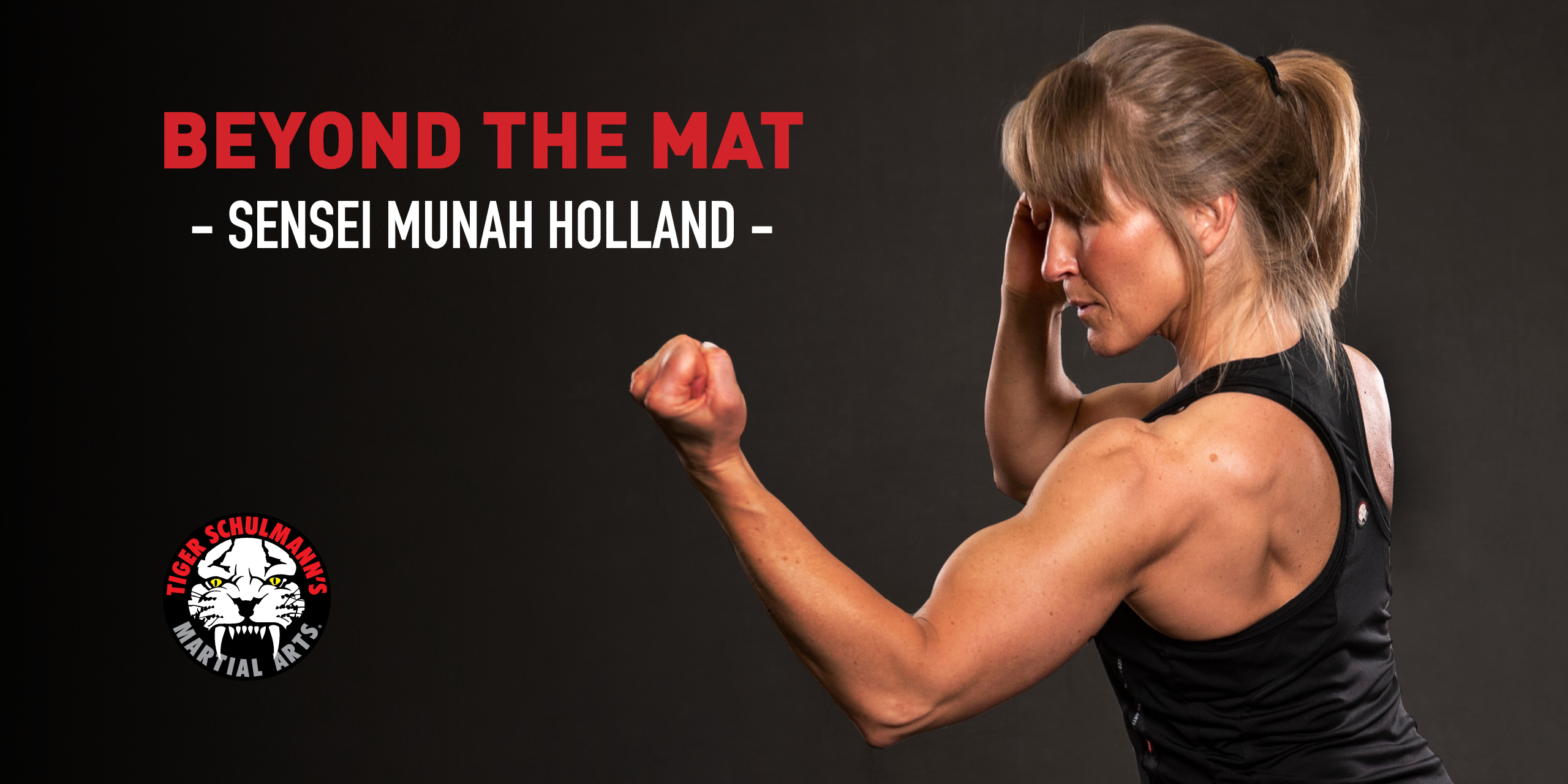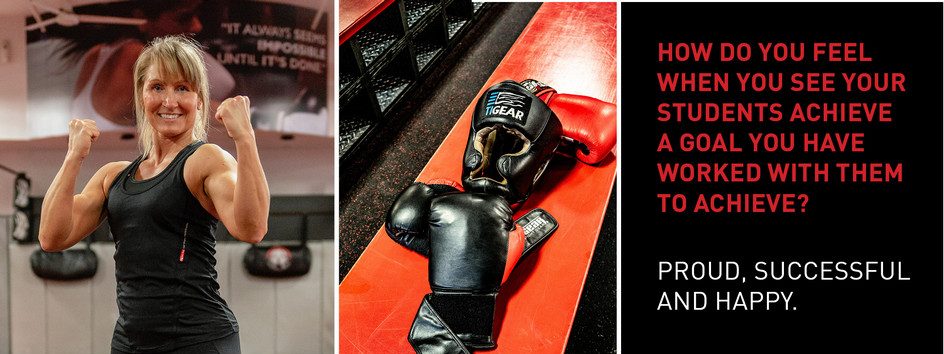Last Updated on August 23, 2019.

An Interview with Sensei Munah Holland
How has martial arts become an integral part of your overall health?
I lost 50 pounds the first year and half of training; the training helped me to keep disease at bay and gave me a tremendous amount of energy. Autoimmune diseases run in my family, my sister has lupus, my mom had thyroid issues, my other sister had parathyroid-ism and my older brother has hypoglycemia. Needless to say I was concerned when my doctor said they needed to run more tests because I was showing signs of a possible thyroid disorder. After only 3 months of training the doctor could not find any symptoms that I was previously displaying. It dumbfounded my doctor and since then I have never had to worry about any negative test results. Training became my life and changed my thinking about food/nutrition and overall physical and mental health. My health and wellness became a priority, which in turn, positively affected everyone else around me, my performance in college skyrocketed and I felt more confident at work which help me get promoted and further my career.
What separates Tiger Schulmann’s training from other types of gyms?
Inspiration, incredibly motivating instruction and a workout that is so much fun it always pushes me to my limits and beyond. I am constantly challenged. My mind and body are always connected when I train. I never think or worry about anything while I am training. I enjoy what I am learning so the time of the workout really does fly by. I always leave feeling better than when I came in and that is thanks to having excellent instructors and very motivating classes.
Share a story of a student that joined Tiger Schulmann’s to make a dramatic change in their health and/or their overall fitness. What results did they achieve under your guidance?
A female student, Erica. It is not so much her health, she is a petite woman who did not have any health risks, but she never ever imagined doing something like this. She had convinced herself that she couldn’t or wouldn’t ever do martial arts. She came to a mother’s night class and really enjoyed it, followed up with the free month offer we provide and that showed her that she absolutely can do it. This took her completely outside of her comfort zone. It has given her a different level of empowerment and confidence. In addition, she has toned up her body and firmed up areas that were previously thin but not strong. She carries herself with strength and piece of mind. It was really more about her mental health and gaining physical confidence. I was happy to have been there to help her see and feel that she’s capable of doing anything!
How do you make your teaching connect to students’ real-world experiences?
Martial arts is all about the battle, ups and downs, working hard and smart and overcoming obstacles so you can achieve your goals. This mirrors life very well. All of our students experience loss, failure and disappointment as well as happiness and joy. When I teach, I know these students well, I know their goals, so it isn’t hard to weave real life experiences into how it relates to what we are doing in the class. It isn’t just how the techniques relate to a real-life self-defense scenario, although I will weave current events into the classes when it is called for, it is more often helping them overcome a mental weakness that they have experienced in their job, at school, with relationships, or family.
Have you competed in martial arts competition? If so, how do you think you benefited from your experience(s)?
Yes I competed often. It made me a more attentive, more patient, and more compassionate instructor. It taught me what I was truly made of and I was able to prove to myself that even under the worst circumstances of loss or failure, I could come back and be an even better version of myself. A version that had more humility and a truer understanding of reality…you can often do everything right to prepare for a competition and still lose. How I dealt with and how I overcame my losses was what really showed me how strong I really was, mentally even more than physically. Competing enabled me to see the challenges my students were facing in their own training/lives and help them to overcome them more effectively. It was also ridiculously, wonderfully fun!
What are you thoughts about the importance of competition for your students?
I honestly feel that it is an integral part of improving your martial art skills, your mental and physical confidence and to teach you the ever important life lesson of success and failure. How do you stack up to others at your level? Where do you really stand? Can you handle loss, if it comes, what will you do with that loss? How will you overcome it? You will never be the same after competing, it defines you, guides you and prepares you for the things life will eventually throw your way.
How do you motivate and set goals for your students?
It is all about taking the time with them and really asking questions to help them open up and then LISTENING, really listening and hearing what they are saying. I will always make sure I understand what a student is truly seeking and as I get to know them better, their goals will change/evolve and I need to be sure to continue communicating with them to stay on top of that. If I understand my student well then it is not hard to motivate them in the classes by helping them to accomplish those goals. I will not give up on them, they know that! I will often take a few minutes after class and pull a student aside to ask how they felt in the class, if there are any concerns, I address them and help them overcome their concerns. I try to always set a positive example, I stay fit and healthy, eat healthfully, train well and often and they see that.
Share an example of how you helped coach or mentor someone. What improvements did you see in the person’s knowledge or skills?
William Sosa, now a teenage student, who started as a much younger child. William struggled with ADHD and when he started I had to have many a meeting with his parents and William to help him control his frustrations. He struggled in school and socially in the beginning, but I would always speak with him and help him to find better alternatives than getting angry and giving up. I am incredibly proud of him because he not only started to really excel in school after training with us but his behavior and overall attitude has taken a 360 degree positive turnaround. He is able to achieve whatever goal he sets, not just in martial arts, in school and with his other sports. He has so much confidence now that he is excelling in other sports, sports that in the past he would never have even attempted to be part of. We continue to have many talks and often they are tough talks to help guide him in the mayhem of teenage life, but he listens and takes the advice. He has made some poor decisions along the way, but we always find a way, together, to sort through the decisions and consequences of his actions. His martial art skills have become incredible, but I am most proud of his positive attitude and improved self-discipline.
Why did you become an instructor and what does it mean to you?
I had an exceptionally motivating and very tough instructor, Sensei Paul Querido who always teaches with his whole entire being. I saw the care and attention he gave all of his students, the time, commitment and selflessness he portrayed. I enjoyed watching him teach and seeing the reaction of the students. I often laughed and laughed while watching him teach the kids because they loved him but were very disciplined and did everything he asked of them. Sensei Querido asked me to come in and help in some of the kids classes on the weekends and that is when I became obsessed with wanting to learn how to teach. I wanted to give back the positive guidance I had been given. I believed I could truly improve someone’s life, just as mine had been. Teaching is fulfillment, joy, pain and pride.
Tell us about the path you took from student to instructor.
The fulfillment, joy and pride of seeing your student achieve and succeed is incredible and the pain you feel for your students who may be struggling in life or in their training (what I mean by this is, as their teacher, you want to relieve and remove that pain, but it can be a long journey). The pain does not last, you know you will get your student (s) through these rough times/spots and then there is the joy and fulfillment once again. I think I may have explained that in the question above…however, I started because my sister Rofiah recommended it for me. At the time I was 50 lbs overweight and had never taken any form of martial art, not seriously. I had tried Taekwondo in Texas but only for 3 months as a trial period. I did not like the Taekwondo classes at all. I became a student simply to lose weight and learn self-defense, but I fell in love with the training and learning. It wasn’t soon after that Sensei Querido entered me into tournaments, from their things just took off. Before I became an instructor I worked many different jobs, the last of which was in an advertising and marketing business. I made very good money but was not happy. My sister kept saying that I should speak to my instructor about possibilities of working at the school. Before I knew it Sensei Querido was asking me to come and help in classes and then one day he asked if I would be interested in making this my career and learning to run a school and teach. I jumped at the opportunity and now my life is fuller and happier for it.
Define “Tiger Schulmann’s” in 3 words.
Joy. Empowerment. Fulfillment.
How do you make learning fun for your students?
It is fun when you feel you can do it and that you are getting better. I try to make sure they always accomplish something in the class so they can walk away and say, “that was fun, I feel great because I was able to do that move really well today.”


